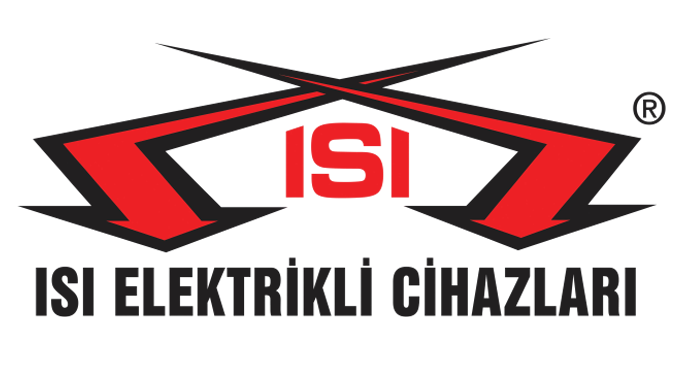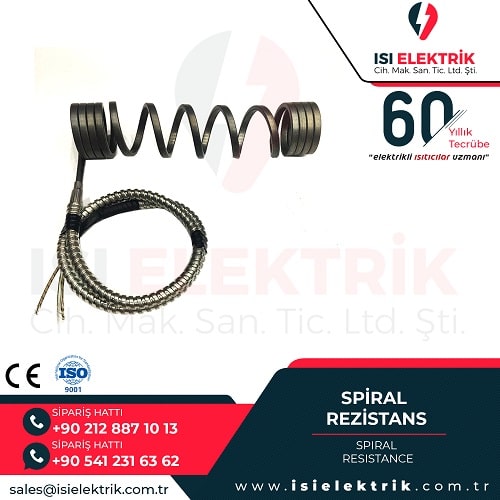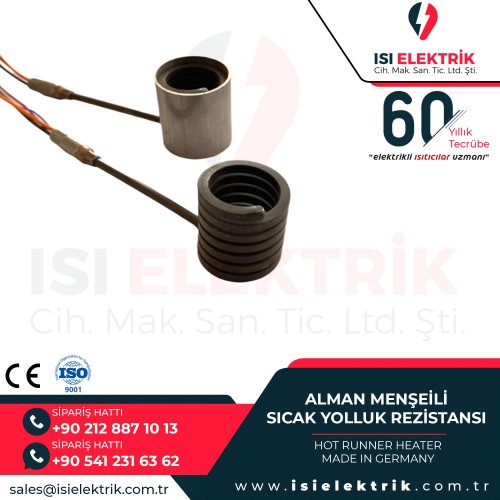Hot Runner Heaters
Hot runner heaters are products that are used in hot runner systems to
reveal the flowability of raw materials. These resistances are also known as
hot runner nozzle resistances. These products heat liquid or gas-passing
pipelines of various diameters. At the
same time, it finds a place in labs and special scientific
projects.
These resistors are also referred to as resistance wires. Its primary function is to convert electrical energy to heat energy. These products enable wires to be produced in a variety of forms and shapes based on their intended use. Wires are made of various metals and special alloy materials.
Call our company right now and we will produce the proper product for your needs.
What are the Usage Areas of Heaters?
In hot runner systems, spiral resistors, also known as hot runners. Furthermore, it has a much broader application range. They are products that are used in a variety of industrial areas and facilities throughout our country. These items are found in injection molds. They serve very important functions here.
Hot runner heaters play a role in the melting and liquefaction of raw materials used in injection molds. At the same time, these products allow plastic raw materials to be heated to the intended temperature. We manufacture these heaters to your watt and volt specifications.
Call us right away for hot runner heater production and orders. Allow us to design and complete the special products for all your requirements.
Hot Runner Heaters Technical Specifications
• Hot runner heaters can be produced in different supply voltages such
as 24V, 48 V, 110V, 220V, and 400V.
• These products are manufactured in
standardized sections. The most used type is
flat-type hot runner heaters with a cross-section of 2.4 mm and 4.5 mm.
• The operating temperatures of these products can be up
to 500 degrees.
• The outer sheath of hot runner heaters is AISI321
quality stainless steel.
• Hot runner heaters are also made with three
Teflon-insulated cables that provide process, neutral, and ground energy
outputs.
• Standard J type thermocouple production can also be
made in the resistances. We also adjust the cable dimensions according to your
wishes and needs.
• The winding type in these resistances is generally
produced as clockwise and counterclockwise. We can also produce radially
passing through the center, vertically 90 degrees, and twisted production based
on your preferences.
• The nozzles of the products are produced from
stainless CrNI pipes.
• Injector nozzles of the products can be opened or
closed via the trigger.
• You can order hot runner heaters from 230 mm to 1650
mm full length. Furthermore, the length of heating varies between 180 mm and
1600 mm.
• These products are produced in standard production
starting from 230 V- 180-Watt power up to 230 V- 1150 Watt.
Spiral Heater Prices
Spiral heater prices vary depending on the product's size, power, material quality, and special design requirements. We manufacture spiral heaters in different power levels and sizes to meet various needs. These heaters, known for their high thermal conductivity and durability, provide an ideal heating solution for industrial applications.
To suit different application areas, our spiral heaters can be customized with different outlet orientations:
- Left-Exit Spiral Heaters: Preferred for ease of connection in confined spaces.
- Right-Exit Spiral Heaters: Used in systems where the connection points are on the right side.
- Center-Exit Spiral Heaters: Ideal for applications requiring uniform heat distribution.
The pricing of spiral heaters depends on the following factors:
- Heater Power (Watt): Special production is available for applications requiring higher power.
- Size and Diameter: Manufacturing is available in different diameters and lengths depending on the application area.
- Material Quality: Models made from high-temperature-resistant materials offer longer life and higher efficiency.
- Special Coatings and Insulation: Additional insulation options are available for chemical resistance, waterproofing, and extended durability.
For detailed information on spiral heater prices, to determine the most suitable product for your needs, and to place custom production orders, please contact us. Our expert team will provide you with the best technical solutions and recommend efficient and durable spiral heater options.
Features of Spiral Heaters Providing High Thermal Efficiency
Spiral heaters offer an effective heating solution for industrial and commercial applications with their specially designed structure and high-quality materials. Developed for energy efficiency and optimal performance, these heaters stand out with their rapid and uniform heat transfer.
Key Features Enhancing the Thermal Efficiency of Spiral Heaters
- High Thermal Conductivity: Spiral heaters are manufactured using high-quality nickel-chrome and stainless steel materials. This ensures rapid and efficient heat transfer for maximum efficiency.
- Uniform Heat Distribution: The spiral shape allows heat to be evenly distributed across the surface, minimizing temperature differences. This feature improves process efficiency by ensuring uniform heating of materials.
- Rapid Heating and Cooling: Due to their low thermal inertia, spiral heaters heat up quickly and cool down rapidly when needed, preventing energy loss. This enables them to reach high temperatures in a short time while maintaining precise temperature control.
- Energy Efficiency: By optimizing heat transfer, spiral heaters consume less energy while generating more heat. This reduces operating costs and provides long-term economic benefits.
- High-Temperature Resistance: Capable of withstanding temperatures of 600°C and above, these heaters maintain long-lasting performance even in demanding operating conditions.
- Compact and Flexible Design: The spiral structure allows easy installation in confined spaces while maximizing surface contact for efficient heat transfer.
- Enhanced Efficiency with Special Coatings: Corrosion-resistant coatings and thermal insulation materials minimize heat loss, ensuring a more efficient heating process.
Spiral heaters are widely used in plastic injection machines, hot runner systems, industrial pipelines, and laboratory applications. For more information about these high-efficiency heaters and customized solutions, feel free to contact us.
Energy Savings with Spiral Heaters
Spiral heaters are specialized heating elements that provide high efficiency and low energy consumption. They offer an effective solution for achieving energy savings in industrial and commercial applications. With the right design and usage, they help businesses reduce energy costs while providing an eco-friendly heating method.
Fast Heating and Cooling: Due to low thermal inertia, spiral heaters quickly reach the desired temperature, preventing unnecessary energy consumption.
High Thermal Efficiency: The spiral design ensures even heat distribution, maximizing heating performance with minimal energy use.
Optimal Power Selection: Choosing the appropriate wattage based on the application's requirements prevents unnecessary energy consumption.
Insulation and Coating Options: Thermal insulation materials and protective coatings minimize heat loss, allowing for higher efficiency with less energy.
Long-Lasting Durability: Made from high-quality materials, spiral heaters offer long-term use, reducing the need for frequent replacements and lowering overall costs.
Automated Temperature Control: When integrated with thermostats and temperature sensors, they prevent energy waste and maintain an optimal temperature level.
Spiral heaters are widely used in plastic injection molding machines, hot runner systems, medical devices, laboratory applications, and industrial furnaces, providing an effective heating solution with energy savings. To learn more about the most suitable spiral heater models for reducing energy consumption and costs, feel free to contact us.
Technical Details to Consider When Choosing a Spiral Heater
Selecting the right spiral heater should be based on the application area and heating requirements. A proper selection ensures energy efficiency while also contributing to the long lifespan of the system. Below are the key technical details to consider when choosing a spiral heater.
Power and Voltage Ratings: It is essential to determine the appropriate power (Watt) and voltage (Volt) values for the intended use. Choosing too low or too high a power level can directly impact system efficiency.
Heater Dimensions: The length, diameter, and coil shape of the heater should be chosen according to the application area. Improper sizing can hinder the desired heating performance.
Heat Distribution: To ensure uniform heat distribution, the heater must be made from suitable materials and designed accordingly. Uneven heat distribution can lead to overheating in some areas and insufficient heating in others.
Material Selection: Depending on the application, materials such as stainless steel, nickel-chrome, or Inconel should be selected. For systems exposed to chemicals or high temperatures, specialized alloys should be preferred.
Connection Type: The connection terminals and cable exit direction of the heater are crucial for easy installation. Models with left, right, or center exits should be chosen based on the setup requirements.
Operating Temperature: The maximum temperature the spiral heater can withstand should align with the required temperature range of the application. For high-temperature applications, heat-resistant coatings may be used.
Insulation and Protection: To minimize heat loss, proper insulation materials should be used, and protective coatings should be selected to guard against environmental factors.
By paying attention to these technical details, a more efficient and long-lasting spiral heater can be selected. For assistance in choosing the most suitable spiral heater model and for more detailed information, feel free to contact us.
Working Principle of Spiral Heaters
Spiral heaters are specialized heating elements that convert electrical energy into heat energy, providing efficient heating for various industrial applications. Their high-temperature resistance ensures a reliable and effective heating solution. Below is a detailed explanation of the working principle of spiral heaters.
Conversion of Electrical Current into Heat: The heating wire inside the spiral heater generates heat when an electric current passes through it. This process is based on Joule’s law, which facilitates the direct conversion of electrical energy into heat.
Heat Distribution: The spiral design ensures that the generated heat is evenly distributed across the surface. This improves heat transfer efficiency and ensures uniform heating of the application area.
High-Efficiency Heating: The spiral shape increases the heater’s surface area, allowing for greater heat dissipation. This results in fast and efficient heating while minimizing energy loss.
Temperature Control Mechanisms: Spiral heaters are often integrated with thermostats, temperature sensors, or automation systems to provide precise temperature control. This prevents overheating and optimizes energy consumption.
Application Areas: Spiral heaters are widely used in plastic injection molding machines, hot runner systems, laboratory equipment, medical devices, and industrial furnaces. They are ideal for applications requiring high-temperature precision heating.
The working principle of spiral heaters ensures efficient heating while providing long-lasting and reliable operation. To learn more about the most suitable spiral heater models for your application, feel free to contact us.
| SECTION DIMENSIONS | OPEN LENGTH (mm) | WATT |
| 5 x 2,5 mm J tipi termokupl 1 metre kablolu | 250 | 210 |
| 280 | 280 | |
| 300 | 300 | |
| 350 | 350 | |
| 370 | 370 | |
| 425 | 400 | |
| 475 | 450 | |
| 500 | 500 | |
| 550 | 550 | |
| 610 | 650 | |
| 690 | 700 | |
| 750 | 750 | |
| 850 | 850 | |
| 900 | 900 | |
| 1000 | 1000 | |
| 1110 | 1100 | |
| 1200 | 1200 | |
| 1250 | 1250 | |
| 1310 | 1300 | |
| 1500 | 1400 | |
| 1600 | 1500 | |
| 1800 | 1600 | |
| 2000 | 1700 | |
| 2100 | 1800 | |
| 2200 | 1900 | |
| 2300 | 1950 | |
| 2400 | 2000 | |
| 2500 | 2100 | |
| 2,2 x 4,2 mm J tipi termokupl 1 metre kablolu | 265 | 150 |
| 265 | 175 | |
| 315 | 200 | |
| 345 | 225 | |
| 400 | 250 | |
| 450 | 290 | |
| 525 | 350 | |
| 585 | 400 | |
| 665 | 470 | |
| 825 | 620 | |
| 965 | 690 | |
| 1165 | 850 | |
| 1265 | 950 | |
| 1465 | 1100 | |
| 1615 | 1200 | |
| 1815 | 1400 | |
| 2015 | 1600 |
Types of Spiral Heaters
- Flexible Spiral Resistors: Flexible spiral resistors are designed to be used on curved or contoured surfaces. Their flexible structure easily conforms to surfaces of different shapes and sizes.
- Spiral Resistors for High-Temperature Applications: Some industrial processes or furnaces require high temperatures. Spiral resistors with special high-temperature resistance are available for such applications.
- Low-Power Spiral Resistors: In some applications, low-power heating may be required. Low-power spiral resistors are used, for example, for some laboratory devices or household appliances.
- Double-Layer Spiral Resistors: Double-layer spiral resistors are designed for applications requiring more intense heating. Two different resistor layers provide higher heat production.
- Coated and Insulated Spiral Resistors: In some applications, spiral resistors need to be protected against external influences and insulated. Coated and insulated spiral resistors are used for this purpose.
Technical Specifications of Spiral Heaters
- Power: Can have a range between 200 Watts and 4000 Watts.
- Voltage: Compatible with voltage levels ranging from 24 Volts to 480 Volts.
- Temperature Range: Can operate within a wide temperature range from 0°C to 600°C.
- Body Material: Can be made of various materials such as stainless steel, aluminum, and brass.
- Heating Element Material: Different materials like nickel chrome, stainless steel, and Inconel can be used.
- Insulation Material: Various insulation materials such as ceramic, mica, and Teflon can be used.
- Size: Can be customized and adapted according to the size and shape of the environment to be heated.
- Connection Type: Various connection methods are available including clamp connection, cable connection, and plug connection.
Other Technical Specifications
- Heating rate
- Cooling rate
- Heat distribution
- Lifespan
- Protection class
- Mounting type
Advantages of Spiral Heaters
- Easy Installation: Spiral resistors are devices that are easy to install and use.
- Fast Heating: Spiral resistors have a feature of rapid heating.
- Uniform Heat Distribution: Spiral resistors evenly distribute heat over a wide area.
- Durability: Spiral resistors have a strong and durable structure.
- Longevity: Spiral resistors are long-lasting devices.
- Efficiency: Spiral resistors use energy efficiently.
- Safety: Spiral resistors can be used safely.
- Versatility: Spiral resistors are available in different power, voltage, temperature range, and sizes.
- Wide Range of Applications: Spiral resistors can be used in many different areas.
- Economical: Spiral resistors are more economical compared to other heating elements.
Materials Used in Spiral Heater Production
- Heating Element: Made from high-resistance alloys such as nickel-chromium, stainless steel, or Inconel.
- Insulation Material: Made from high-temperature resistant materials such as ceramic, mica, or Teflon.
- Body Material: Made from corrosion-resistant materials such as stainless steel, aluminum, or brass.
- Connection Elements: Connectors such as terminals, cables, or plugs are used.
Other Materials Used in Spiral Heater Production
- Filling Material: Some spiral resistors use filling material to distribute heat evenly.
- Protective Coating: Spiral resistors can be coated with a protective coating to protect against corrosion and wear.
Technical Details to Consider When Choosing Spiral Heaters
- Power: The power of the spiral resistor depends on the size of the area to be heated and the desired temperature.
- Voltage: The voltage of the spiral resistor should be compatible with the electrical source used.
- Temperature Range: The temperature range of the spiral resistor should match the desired temperature range of the area to be heated.
- Body Material: The body material of the spiral resistor should be suitable for the environment it will be used in.
- Heating Element Material: The heating element material of the spiral resistor should be selected based on the desired temperature and lifespan.
- Size: The size of the spiral resistor should be suitable for the area to be heated.
- Connection Type: The connection type of the spiral resistor should be compatible with the electrical system used.
Other Technical Details:
- Heating Speed: The heating speed of the spiral resistor determines the time it takes to reach the desired temperature.
- Cooling Speed: The cooling speed of the spiral resistor determines the time it takes for the environment to cool down after the heating process.
- Heat Distribution: The heat distribution of the spiral resistor ensures uniform heating of the area.
- Lifespan: The lifespan of the spiral resistor depends on usage conditions and materials used.
- Protection Class: The protection class of the spiral resistor determines its resistance to dust and water.
- Mounting Type: The mounting type of the spiral resistor should be chosen according to the location and purpose of use.

-500x500w.jpg)
-500x500w.jpg)
-500x500w.jpg)
%20REZİSTANS-min-500x500.jpg)

-min-500x500.jpg)
%20REZİSTANS%20(2)-min-500x500.jpg)
